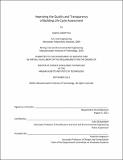Improving the quality and transparency of building life cycle assessment
Author(s)
Hsu, Sophia Lisbeth
DownloadFull printable version (1.436Mb)
Other Contributors
Massachusetts Institute of Technology. Dept. of Architecture.
Advisor
John Ochsendorf.
Terms of use
Metadata
Show full item recordAbstract
Life cycle assessment, or LCA, is a powerful method for measuring and reducing a building's environmental impacts. Its widespread adoption among designers would allow the environmental component of sustainability to gain more traction in design philosophy and client goals. Currently, the stakeholders in building design-both design professionals and clients-have few resources for proper LCA education and use, and there are no common metrics agreed upon for reporting the results of LCAs for buildings. This thesis assesses the strengths and weaknesses of resources available to design practitioners for performing LCA, including a pilot credit in the United States Green Building Council's Leadership in Energy and Environmental Design ratings system. A case study performs an LCA comparing two structural materials in an office building. The study aims to be as transparent and repeatable as possible, in order to set a good example on which to model future building LCAs. Based on the critical review of LCA resources and the lessons learned from the case study, eight key points are proposed for improving the quality and transparency of building life cycle assessment projects.
Description
Thesis (S.M.)--Massachusetts Institute of Technology, Dept. of Architecture, 2011. Cataloged from PDF version of thesis. Includes bibliographical references (p. 54-60).
Date issued
2011Department
Massachusetts Institute of Technology. Department of ArchitecturePublisher
Massachusetts Institute of Technology
Keywords
Architecture.